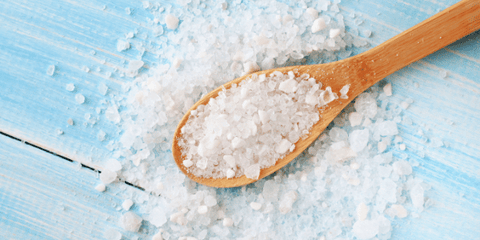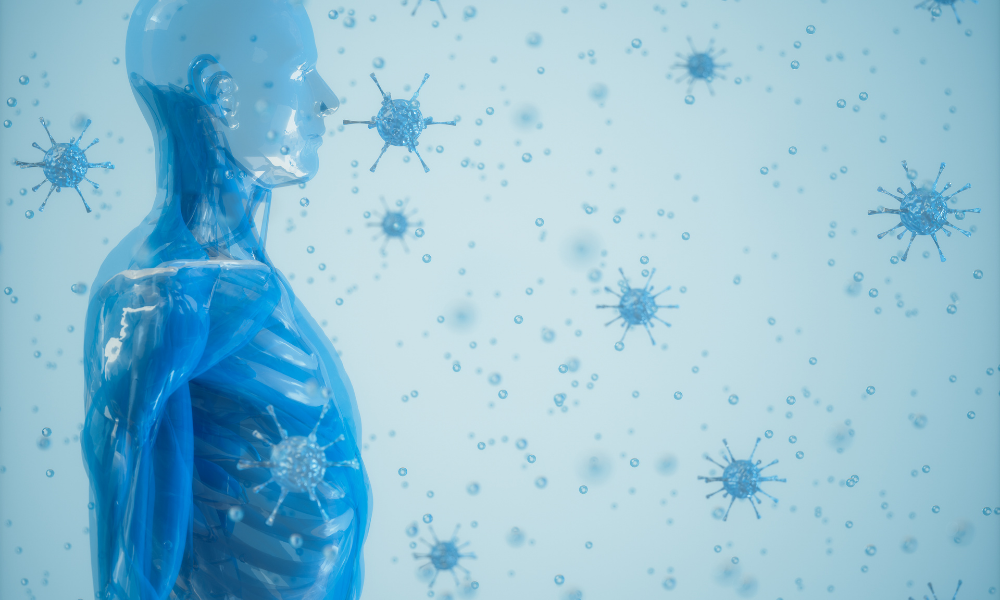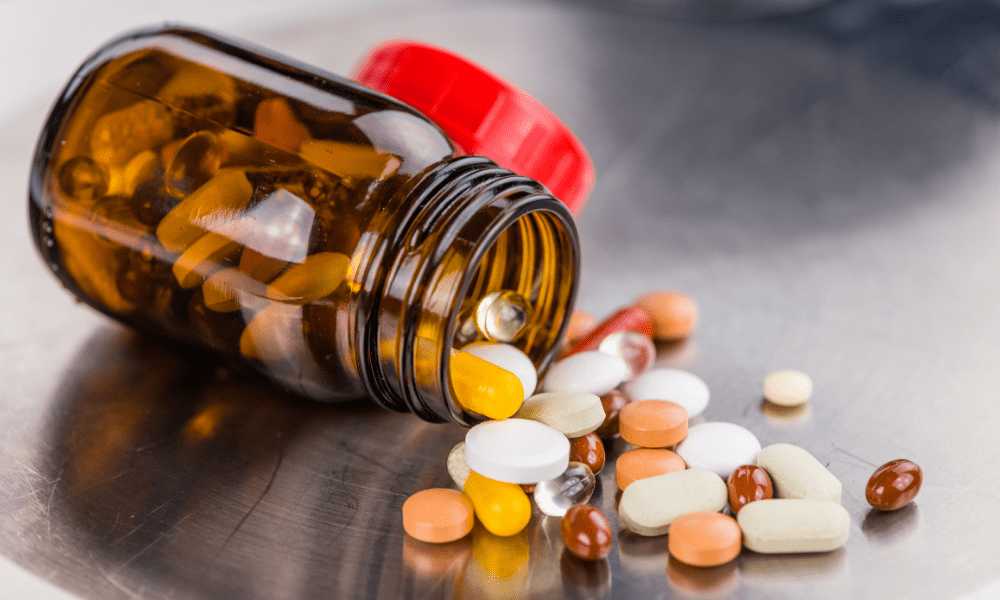Many people still know it from earlier times: the burning liquid that our parents applied to our scraped knees or small wounds. Iodine! But did you know that this trace element is not only suitable for wound care, but also has an important function in your body? This Article has compiled some interesting facts for you.
IT'S WORTH READING!
AT THE END OF THE ARTICLE WE WOULD LIKE TO GIVE YOU A LITTLE JOY WITH A VOUCHER!
What is iodine actually?
First, a fact that you may not even know: According to the Federal Institute for Risk Assessment (BfR), Germany is still an iodine deficiency area.
This is because the soil in our country does not contain enough iodine (or iodine) and therefore we do not absorb enough through our food.
Iodine is an essential trace element and, along with magnesium , selenium , potassium and many other minerals, is responsible for important processes in the body. Thyroxine, for example, an important thyroid hormone, could not be produced at all without iodine.
Cell growth and division and our body temperature are further examples in which the trace element plays a key role. As you can see, nothing works in the body without iodine.
Let’s go a little deeper.
What is iodine good for?
As already mentioned, iodine is, among other things, a component of the thyroid hormone thyroxine. Thyroid hormones are responsible for a variety of metabolic processes in the body. Therefore, dysfunctions can have dangerous consequences for metabolism and development.
But it is not only important for metabolism. Our nervous system and our organ systems also depend on the trace element.
If there is an iodine deficiency, this can lead to the formation of a goiter - also known as struma. Perhaps you have seen this yourself: a goiter is a visible enlargement of the thyroid gland in the neck. The body tries to compensate for the iodine deficiency by forming more thyroid tissue. By increasing the iodine intake, a goiter usually goes away again.
However, if the deficiency persists over a longer period of time, nodules can form in the tissue. These are no longer able to respond properly to the body's signals.
In addition to an underactive thyroid (hypothyroidism), in which only small amounts of the important hormones triiodothyronine (T3) and tetraiodothyronine (T4) are produced, other symptoms can also occur. These include, for example, shortness of breath, weight gain, reduced fertility or a high heart rate.

How iodine can promote health
The influence of the trace element has now been well researched. Below we give you a few examples that show in which areas the element is still used and promotes health.
Iodine could improve birth weight
Iodine may help in achieving a healthy birth weight.
A 2015 study of pregnant women suggests that daily supplementation with 400 mg of iodine for six to eight weeks could lead to an overall improvement in the birth weight of newborns.
The antibacterial properties of iodine
As mentioned at the beginning: When applied to wounds, scratches and infections, the trace element kills harmful bacteria. In medicine, it is therefore often used as an antiseptic.

It could be important for children's cognitive functions
There is no question that healthy brain function in childhood is the basis for further healthy development. In fact, iodine offers the same neurological benefits as it does during development in the womb.
In contrast, a deficiency of the trace element can, in the worst case, lead to mental disability, as the results of a study suggest.
Iodine can support the treatment of thyroid cancer
The radioactive variant of the element, the so-called “radioiodine” (iodine-131), is used to support the treatment of thyroid cancer.
This takes advantage of the fact that the body is unable to distinguish between radioactive and non-radioactive iodine. It stores as much of it as possible in the thyroid. Once there, the radioactivity (beta radiation) specifically damages and destroys diseased cells.
Because iodine-131 only has a half-life of eight days and the body gradually excretes it, this form of therapy is considered relatively safe and has few side effects.

How much iodine do I need?
The German Society for Nutrition has published a guide with values that gives you an overview of the daily recommended amount of iodine you should consume.
Accordingly, the daily iodine requirement is approximately 200 µg.

Foods that contain iodine
Unfortunately, due to the low iodine content in the soil, agricultural products only contain small amounts of the trace element. Fish and seafood, on the other hand, have a high iodine content.
But even though iodine is added to almost all feed and we use iodized table salt, the iodine supply in Germany is still not satisfactory.
To meet the iodine requirement, it can be helpful to take a high-quality and quality-tested food supplement, e.g. from brown algae to take with you.
To give you a better overview, we have listed a selection of iodine-containing foods for you below:
- Algae: 120 µg/100 g
- Oysters: 58 µg/100 g
- green beans: 290 µg/100 g
- Shrimp: 130 µg/100 g
- Halibut: 52 µg/100 g
- Cod: 170 µg/100 g
- Mussels: 130 µg/100 g
- Haddock: 243 µg/100 g
- Pollock: 200 µg/100 g
- Milk and dairy products: 10-15 µg/100 g
- Chicken egg: 9.7 µg/100 g
- Beef heart: 30 µg/100 g
- Rye bread: 8.5 µg/100 g
- Okra pods: 5-6 µg/100 g
- Asparagus: 7 µg/100 g
- White cabbage: 5.2 µg/100 g
- Lemon juice: 5.2 µg/100 g
- Black tea: 8-11 µg/100 g
- Kiwi: 80 µg/100 g
- Kale: 12 µg/100 g
Fish and seafood
According to the Icelandic Food Content Database, low-fat fish have the highest amounts of iodine.
They are also considered a good source of omega-3 fatty acids , which can reduce the risk of heart disease.
Eggs
Eggs are also a good source of iodine. For less than 100 calories per piece, eggs provide such high-quality nutrients that the Federal Center for Nutrition uses them as reference values for the biological value of, for example, protein.
Because iodine is added to the feed, its content in chicken feed and ultimately in the eggs themselves can fluctuate.

Conclusion: Iodine helps far beyond wound care
Iodine is a trace element that is responsible for maintaining many basic processes in the body. It plays an important role, especially in the thyroid gland, for example in the body's metabolism, cell health or body temperature.
It has antibacterial and antiseptic properties, and is important for cognitive function.
Because the soil in Germany is relatively low in iodine, many people unfortunately do not have an adequate supply of iodine. Taking a high-quality supplement can help to ensure iodine supply.
AS PROMISED, YOU WILL RECEIVE A 10% VOUCHER FOR OUR IODINE FROM ORGANIC KELP .
SIMPLY COPY THE CODE JOD+V10 AND ENTER IT AT CHECKOUT.
Click here for the product
[1] https://www.bfr.bund.de/de/jodbedarf_in_deutschland_wieder_ruecklaeufig___tipps_fuer_eine_gute_jodbedarf-128626.html
[2] https://pubmed.ncbi.nlm.nih.gov/21748117/
[3] https://pubmed.ncbi.nlm.nih.gov/23472655/
[4] https://pubmed.ncbi.nlm.nih.gov/21748117/
[5] https://pubmed.ncbi.nlm.nih.gov/25629792/
[6] https://pubmed.ncbi.nlm.nih.gov/25231449/
[7] https://pubmed.ncbi.nlm.nih.gov/18696273/
[8] https://pubmed.ncbi.nlm.nih.gov/23201844/
[9] http://www.fao.org/infoods/infoods/tables-and-databases/europe/en/
[10] https://nutritiondata.self.com/facts/finfish-and-shellfish-products/4146/2
[11] https://www.ncbi.nlm.nih.gov/pmc/articles/PMC5067287/
[12] https://www.ncbi.nlm.nih.gov/pmc/articles/PMC2691155/
[13] https://nutritiondata.self.com/facts/dairy-and-egg-products/111/2
[14] https://link.springer.com/article/10.1007/s00217-012-1693-z
[15] https://link.springer.com/article/10.1007/s00217-012-1693-z
[16] https://ods.od.nih.gov/factsheets/Jodine-HealthProfessional/#h3
[17] https://www.mdpi.com/2072-6643/9/4/401/htm
[18] https://pubmed.ncbi.nlm.nih.gov/16351514/
[19] https://www.bfr.bund.de/de/a-z_index/jod-4600.html

















